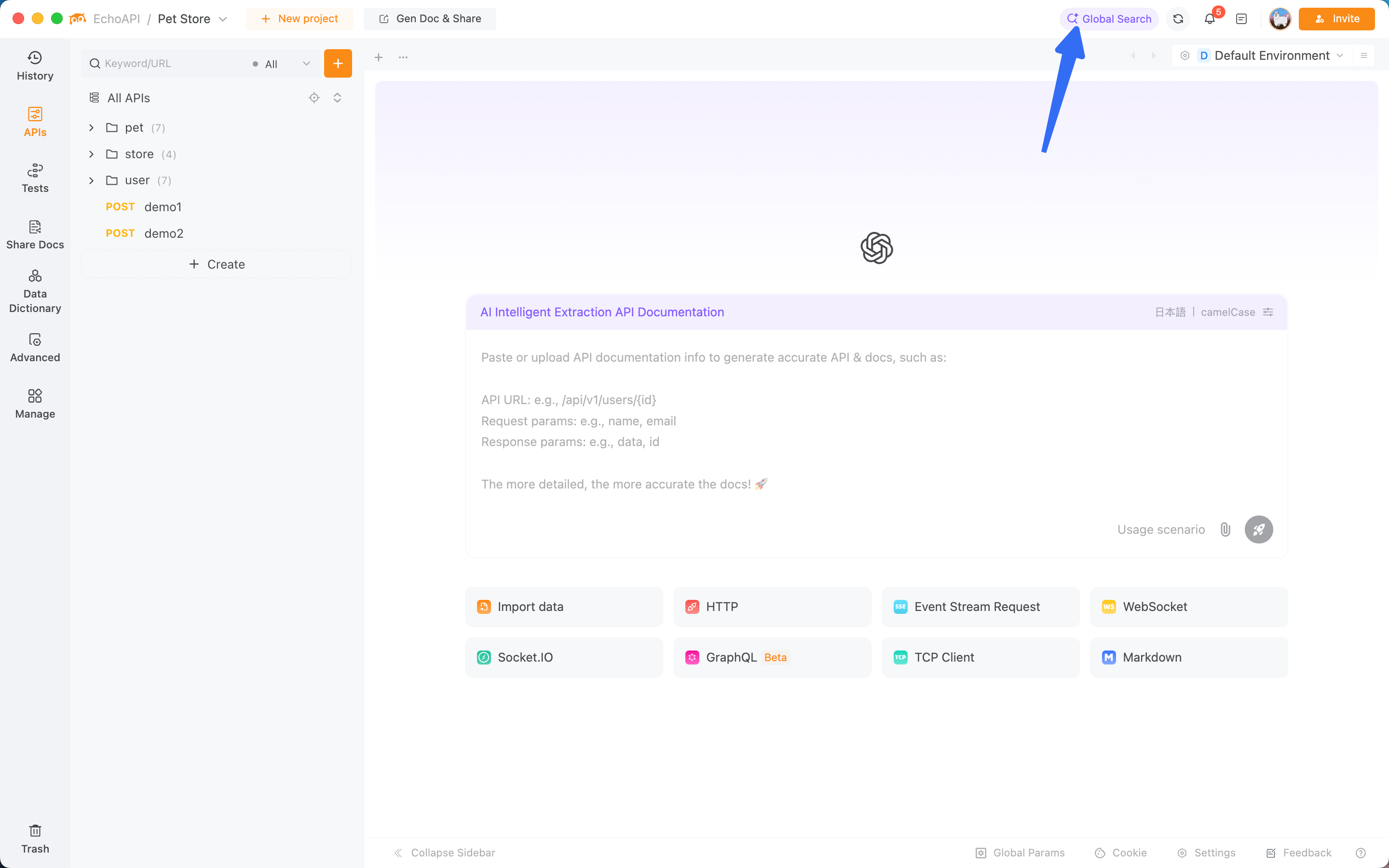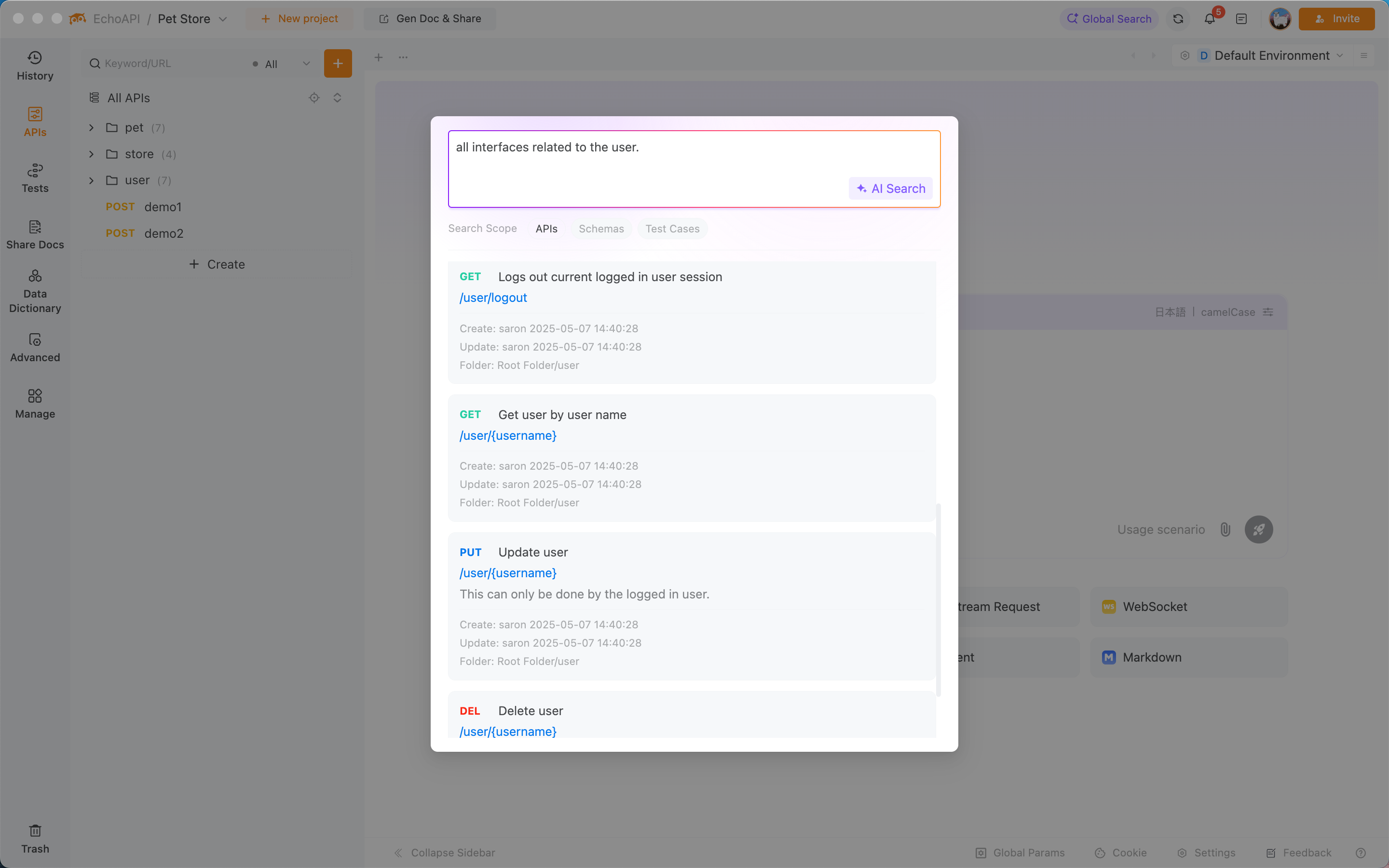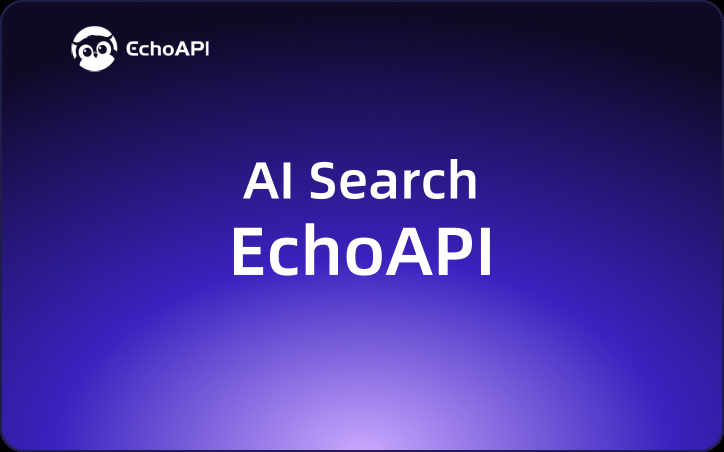Using AI to Search API Endpoints? EchoAPI Helps New Developers Ramp Up on Legacy Projects in Just One Day
EchoAPI 「AI Search」transcends traditional keyword matching by supporting natural language queries. It enables global precision targeting of relevant APIs, delivering intelligent fuzzy matching that fulfills "think it, search it" functionality.
“Code in the morning, debug in the afternoon, lose sanity over APIs by evening.”
Sound like your Tuesday? Then this post is for you.
Let’s talk about why and how AI-powered API search (especially the delightful one from EchoAPI) is here to rescue your productivity (and possibly your soul).
Scene One: A Day in the Life of a Developer (a.k.a. You)
9:00 AM — Fresh coffee, fresh repo
You're feeling invincible. Terminal’s open, Slack's quiet, and you just pulled the latest from main without any conflicts. Life is good.
10:17 AM — Time to wire up user login
“Just gotta call our login API,” you whisper.
You crack open the internal API docs. You type:
login
And then… the API jungle hits you.
userLoginBasicV2
authByToken
initiateSession
SessionEntryPointLegacy
“Who names these things?! Was this an inside joke?”
You try one. It returns an unexpected 403.
Try another. Needs an OAuth token you’ve never seen.
A third one? Oh great—it’s deprecated.
Before you know it, it’s noon. You’ve eaten nothing but confusion.
Welcome to the Future: AI Search Has Entered
What if you could just tell your API platform:
“Hey, I need the thing that logs a user in and sends them a 2FA code.”
And it shows you the exact endpoints, grouped by use case, with links and descriptions like a helpful robot intern that doesn’t ask for coffee breaks?
That’s EchoAPI’s AI Search in action.
It doesn’t care what the API is named. It cares what you’re trying to do.
AI Search: Not Just Smarter. Actually Helpful.
What makes it magical?
- You type something like:
"Send an SMS verification code for user login" - It reads between the lines, understands your intent.
- It returns:
✅SendSMSCode
✅VerifyUserOTP
✅InitPhoneAuth
No keywords, no memorization, no yelling at your monitor.
Real Dev Scenarios (a.k.a. Stuff That Happens Every Day)
Scenario 1: “I Know What I Want. Just Not What It’s Called.”
You want to send an OTP to a user’s phone. You type:
search("Send SMS code to user")
Normal Keyword search gives you:
PushMobileTokenV1OTPManagerNewTextMessageDispatcherAlpha
You: “Cool. All equally cryptic. Thanks.”
✅ EchoAPI’s AI Search gives you:
SendSMSCodeVerifyPhoneTokenOTPDispatcher
You: “That’s the one. That’s the one!!”
Scenario 2: New Dev Joins. API Naming Is a Minefield.
Your team just onboarded Sam. Bright kid. But they don’t know that your login APIs all start with Session instead of Login.
They type:
“APIs for user login, identity check, and password reset”
✅ AI Search returns:
SessionStartVerifyIdentityResetUserPasswordTokenRefresh
Boom. Sam’s productive on Day 1. Slack stays quiet. You become a mentor instead of a human search engine.
Scenario 3: You Need a Toolbox, Not Just a Hammer
Building a new user profile dashboard? You’re gonna need:SignupLoginLogoutProfile editPassword update
Typing each manually into keyword search is a pain.
Instead:
"All APIs for user registration, login, profile update"
✅ AI Search says:
RegisterUserLoginSessionLogoutUserUpdateProfileChangePassword
Grouped, labeled, ready to use.
What’s Actually Happening Behind the Scenes?
EchoAPI’s AI Search isn’t some janky autocomplete.
It’s powered by Natural Language Processing (NLP) and fuzzy matching that knows “log out” and “terminate session” mean the same thing (even if your API doesn’t).
It does things like:
- Intent detection → "Reset password" =
UserPasswordReset - Semantic understanding → Understands vague phrases like “get nearby restaurants”
- Error tolerance → Forgives typos and awkward phrasing
- API grouping → Pulls together related interfaces by functional intent
It’s like ChatGPT... but only trained to care about your API ecosystem.

Side-by-Side Showdown
| Feature | Normal Keyword Search 😫 | EchoAPI AI Search 😎 |
|---|---|---|
| Matching logic | Exact string | Intent & semantic |
| Handles vague terms | Nope | Yup |
| Great for new devs | Nope | 100% |
| Batch discovery (e.g., "all auth APIs") | Manual effort | One-shot query |
| Speed to answer | Slow, painful | Quick and confident |
| Rage quit factor | High | Almost zero |
Bonus Use Cases You Didn’t Know You Needed
Onboarding Interns or Juniors
“What API resets the password?”
They just ask the system. You don’t need to jump on a call. Productivity stays high.
Cleaning Up Old Stuff
“Find all deprecated user-related APIs”
AI Search sees through notes, tags, and descriptions like a pro.
Handling Legal Compliance
“APIs needed for GDPR-compliant user deletion”
AI Search returns:
DeleteUserAccountAnonymizeUserDataRevokeAccessTokens
That’s half your compliance checklist done.
What Happened When We Put EchoAPI at the Center
Okay, so you get it—EchoAPI's AI Search is like an API-savvy teammate who speaks fluent human. But what happens when you don’t just use it occasionally—but actually build your team’s dev workflow around it?
Here’s how EchoAPI, combined with an “API-first” mindset, reshaped how we work:
From Guessing to Shipping
| Area | Real-World Benefits | Explanation |
|---|---|---|
| Collaboration | Schema-first = pixel-perfect handoff | Frontend & backend speak JSON instead of sarcasm. No more “wait, what’s this field for?” |
| Mock = contract, not placeholder | Even if the API isn’t done, frontend keeps shipping. Mock APIs = living documentation. | |
| Fields have context, not just names | Every property comes with type, example, source, and purpose—QA and testers rejoice. | |
| People collaborate via spec, not vibes | “Talk to the contract” becomes the new “talk to the guy who wrote it.” | |
| Scalability & Reuse | Unified response structures everywhere | Pagination, error messages, loading states—handled by shared frontend logic, not copy/paste. |
| Consistent APIs = future-ready systems | When interfaces are stable and sane, platforms scale better, faster, and with fewer therapy sessions. | |
| Stability & Control | Schema catches issues early | Catch bad naming, nested chaos, or missing fields before they sneak into prod. |
| Change tracking keeps teams aligned | Versioning + change logs = no more “who broke this?” detective work. | |
| Predictable structure = safer updates | If the shape never changes, your frontend doesn’t break. Simple math. | |
| Automation | Docs, mocks, tests—all auto-generated | Define once, deploy many. One schema powers dev, QA, and release. |
| Easy toolchain integration | EchoAPI plays nice with docs platforms, test runners, and CI/CD. No duct tape needed. |
What Did We Actually Gain?
In a word: sanity.
Fewer bugs from mismatched fields
Faster iteration (even on unfinished APIs!)
Clearer ownership and fewer Slack messages asking “is this field optional?”
Happier devs who can focus on building features instead of decoding endpoints


Final Take: EchoAPI Isn’t Just a Tool—It’s an Upgrade to How You Work
EchoAPI isn’t here to make your API docs prettier.
It’s here to make your entire dev process smarter.
With EchoAPI, you get:
- Fewer misunderstandings
- Fewer regressions
- More solid foundations
- More automation
- Faster releases
It’s like giving your entire team an ops, docs, and QA assistant who never sleeps—and always reads the fine print.
Design it once. Search it like you talk. Build like the API already exists.
Whether you're a solo dev or wrangling a 30-person engineering team, EchoAPI is your secret weapon.
Just describe what you need. EchoAPI will find it, format it, and let you mock it before your backend team finishes their first coffee.




 EchoAPI for VS Code
EchoAPI for VS Code

 EchoAPI for IntelliJ IDEA
EchoAPI for IntelliJ IDEA

 EchoAPl-Interceptor
EchoAPl-Interceptor

 EchoAPl CLI
EchoAPl CLI
 EchoAPI Client
EchoAPI Client API Design
API Design
 API Debug
API Debug
 API Documentation
API Documentation
 Mock Server
Mock Server









